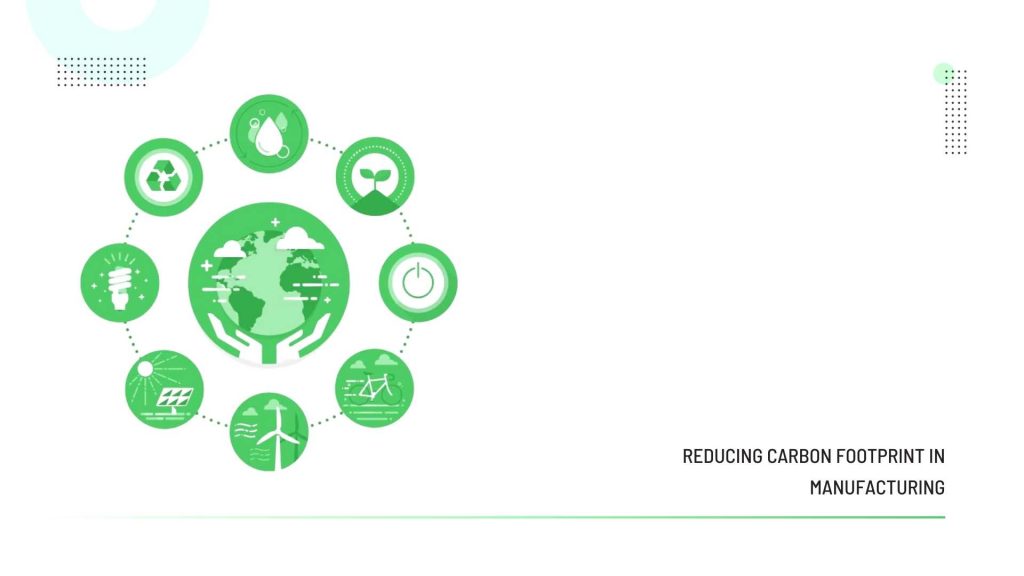In today’s rapidly evolving industrial landscape, prioritizing sustainability is no longer just a noble goal but a strategic imperative. Manufacturers embracing sustainable practices can cut costs, enhance their competitive edge, and build positive relationships with suppliers, customers, and regulators. Let’s explore some key sustainable practices that can transform manufacturing operations.
Sustainable Practices for Manufacturers
Taking Advantage of Renewable Energy:
Leveraging renewable energy methods can significantly reduce a manufacturer’s carbon footprint, lower energy costs, and bolster its reputation as an environmentally conscious organization.
Adoption of Digital Manufacturing:
Digital manufacturing technologies, including AI and big data analytics, enable manufacturers to optimize their operations. These technologies enhance precision, reduce material wastage, and improve overall efficiency, contributing to more sustainable production processes.
Adopting of a Circular Economy:
The circular economy model emphasizes designing products for durability, reusability, and recyclability. Manufacturers embracing this approach can reduce waste, optimize resource utilization, and establish a closed-loop system that benefits both the environment and the economy.
Sustainable Logistics:
Logistics sustainability is a vital aspect of supply chain management that focuses on minimizing the environmental impact of transportation and distribution activities. Adopting sustainable practices in logistics involves optimizing route planning, utilizing fuel-efficient vehicles, and implementing efficient packaging techniques. Prioritizing logistics sustainability leads to reduced carbon footprint and improved efficiency.
Bioplastics:
Bioplastics from renewable sources like corn and sugarcane are a sustainable substitute for petroleum-based plastics. They are biodegradable and compostable, and demand for them in manufacturing has surged due to plastics’ harmful environmental impact. Bioplastics produce various products, including food packaging, consumer goods, and automotive components.
Waste Reduction:
Manufacturers can adopt various waste reduction strategies, such as lean manufacturing, recycling programs, and waste-to-energy initiatives. These practices help reduce the environmental impact, lower operational costs, and improve resource efficiency.
Investing in Energy-Saving Machinery:
Upgrading energy-efficient machinery and equipment can save energy and reduce greenhouse gas emissions. Manufacturers should invest in technologies that offer high efficiency and low energy consumption, aligning with their sustainability goals.
Challenges of Sustainable Manufacturing
Regulatory Compliance
Navigating the intricate landscape of environmental regulations poses a significant challenge for manufacturers. Compliance with local, national, and international laws demands continuous monitoring and adaptation of practices, often requiring substantial resources.
Cost Implications
While sustainable practices can lead to long-term savings, the initial investment for new technologies, renewable energy systems, and process changes can be substantial. Manufacturers must balance the upfront costs with the potential long-term benefits.
Supply Chain Sustainability
Ensuring that every part of the supply chain adheres to sustainable practices can be difficult. Manufacturers must work closely with their suppliers to promote sustainable sourcing, production, and logistics practices, which requires strong collaboration and transparency.
Sustainable Manufacturing Technologies
Industrial Automation
Automation technologies streamline production processes, enhance precision, and reduce material waste. Automated systems can monitor energy usage in real time, identify inefficiencies, and adjust to optimize energy consumption, contributing to a more sustainable manufacturing operation.
Paperless Manufacturing
Adopting paperless processes through digital documentation, electronic workflows, and automated data collection reduces paper waste and enhances operational efficiency. This transition supports environmental sustainability and improves data accuracy and accessibility.
Conclusion
Acumatica ERP fosters manufacturing sustainability by reducing waste, optimizing energy use, and streamlining operations. With comprehensive tools for managing resources, tracking energy consumption, and enhancing process efficiency, Acumatica ERP enables manufacturers to achieve their sustainability goals while maintaining high levels of productivity and competitiveness. Through its innovative solutions, Acumatica ERP supports the creation of a sustainable and resilient manufacturing ecosystem.

Vijay comes with a vast experience in ERP and enterprise solutions space with about 20 years of experience in various packaged application like Acumatica, SAP, Orion, Salesforce.com, SugarCRM and, SalesLogix.

